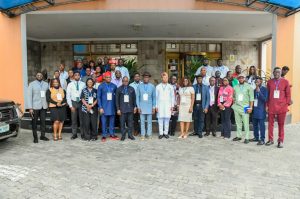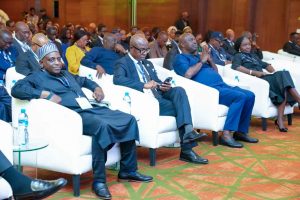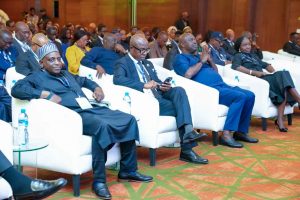Minister of Petroleum Resources, Mrs. Diezani Alison-Madueke, has said the recent award of crude oil term contracts primarily to indigenous oil and gas companies is part of the federal government’s larger objective to encourage effective local participation in the operations of the Nigerian oil and gas industry.
The minister’s defence came amidst allegations that she had still not responded to any of the queries from the House of Representatives’ Committee of Public Accounts demanding information on the charter of two private jets for her personal use by the Nigerian National Petroleum Corporation (NNPC).
Alison-Madueke, in a statement from NNPC yesterday in Abuja, said the decision to award over 60 per cent of the 2014 to 2015 crude oil term contracts to local firms was taken after a painstaking pre-qualification process.
In the statement signed by the Group General Manager, Public Affairs of NNPC, Ohi Alegbe, she said the balance of 40 per cent was shared among some international oil trading companies, refineries as well as some countries with bilateral trade agreements with Nigeria.
“When we unveiled the Nigerian content law a few years back, the overriding principle was to grow indigenous capacity in an aggressive manner and I am happy to report that today, in the oil and gas sector, Nigerian content has been placed on the path of irreversible progress,” Alison-Madueke said.
She further noted that the lifting award to local players remained in line with the aspirations of President Goodluck Jonathan to effectively transform operations in the country’s petroleum industry.
According to her, the advent of the Nigerian content law, which was signed in 2010 by the president, has encouraged indigenous investment in critical infrastructure such as marine vessels, petroleum depots and jetties, among other infrastructure.
“We have seen robust indigenous investments in marine vessels of various categories and wholly-owned Nigerians vessels have increased astronomically through the years. These vessels are the category one and category two types.
“Investments in reception, storage and distribution facilities such as jetties, depots, trucks, vessels and modern retail outlets have more than doubled over the past few years and this has helped to increase the nation’s sufficiency level in petrol,” she added.
The minister also explained that at the last count, indigenous investments in the sector had created over 40,000 jobs across the hydrocarbon value chain, saying: “We have witnessed increased local investments in asset, in land, swamp and offshore rigs, which are vital performance indicators in business growth in Nigerian service companies. As we speak, Nigerian companies are forging partnerships for deep water rig ownership and are evolving strategies that will increase rig ownership among local players.”
In a related development, the federal government’s efforts to find alternative markets for Nigeria’s crude oil, after exports to the United States dropped, has received a big boost as Argentina has ordered (for) Nigerian Bonny Light crude, with the first cargo expected to arrive at the country’s Bahia Blanca seaport in the first week of next month.
Reuters reported yesterday that Argentina’s state-run oil company, YPF, awarded a tender to buy a one million barrel cargo of Nigerian Bonny Light crude to trading firm, Vitol.
This development marks the first time Argentina, which produces 700,000 barrels per day (bpd) of crude oil, according to the United Energy Information Administration, has agreed to buy Nigerian crude, since the South American country lifted restrictions on crude imports in January this year.
Sources within the Argentinian government were quoted as saying that the plan to buy crude oil from Nigeria and other countries was taken to ensure the importation of cheaper crudes instead of more expensive finished fuels.
“The cargo will be delivered in the second week of May at Bahia Blanca port and then the crude will be distributed by Enarsa to several Argentine refineries, including Campana, La Plata and Buenos Aires,” one of the sources was quoted as saying.
Enarsa, another Argentine state-run oil company, will be in charge of receiving the cargo and will deliver the crude to refining companies.
Axion Energy’s 90,000 bpd Campana refinery, the country’s fourth-largest, is undergoing a planned major maintenance.
YPF declined to comment and Vitol was not immediately available.
Like other Latin American countries, Argentina’s crude oil is heavy, hence imports from Nigeria and other producers will give it access to cheap West African light crudes to feed domestic refineries and produce a larger volume of refined products.
Nigeria’s Bonny Light is the toast of foreign refineries, being very light sweet crude with a density of 35 API degrees.
The federal government has been looking for alternative markets for its crude oil since the growing oil output in the US and the discovery of shale gas reduced North American demand for light sweet crudes.
Nigeria’s crude oil exports to the US, which stood at 1 million bpd in December 2009, have since declined to below 350,000bpd, representing a loss of about 70 per cent of the US market.
Though Asian countries are said to be increasing crude oil imports with China overtaking the US as the biggest importer of Nigerian crude, it is, however, more difficult to ship crude oil from Nigeria to Asian countries than to the US because of the long distances.
For instance, the distance from the Shell’s Bonny Export terminal in Rivers State, to Tianjin, China, is 12,172 miles, compared to 5,847 miles to the New York harbour in the US.
With these long distances, Asian refiners are said to be demanding discounts to buy Nigeria’s crude.
Meanwhile, as the probe into the alleged charter of two executive jets by NNPC for the Minister of Petroleum Resources commences today, it has emerged that Alison-Madueke, NNPC, the Federal Airports Authority of Nigeria (FAAN) and other agencies of the federal government who were requested to provide information have studiously ignored the House committee responsible for undertaking the investigation.
Investigations by THISDAY showed that all the government agencies and minister have not responded to the queries by the House’s Public Accounts Committee (PAC) and may not turn up at the public hearing.
The House last month had mandated PAC to conduct a public hearing on the alleged billions of naira spent on the charter and maintenance of two executive jets by NNPC for the personal use of the minster and her family.
PAC had sent a memo to the minister, NNPC, the operators of the executive jets and other government agencies ahead of the public hearings.
But up till yesterday, none of the principal actors in the deal had responded to the memo.
This, it was gathered, has compelled the committee to resolve to meet over the issue and chart a way forward.
“As I speak, we are yet to hear from the minister and others. All we are hearing is that the public hearing would not hold. But I can assure you that as lawmakers we will do our part of it, even if it means issuing a warrant of arrest on those involved. Nobody is above the law of the land,” a member of the committee informed THISDAY.
The chairman of PAC, Hon. Solomon Adeola Olamilekan, also confirmed that his committee would meet today but he did not specify whether it would be for the purpose of the hearing or otherwise.
“All I can say for now is that our committee will meet tomorrow (today) on the matter and thereafter we will revert to the House on the next course of action,” he said.
When contacted, the House spokesman, Hon. Zakari Mohammed, said there was no cause for alarm and that the committee saddled with the responsibility of looking into the matter was on the top of the situation for now.
Discover more from Nigerian Content Development & Monitoring Board
Subscribe to get the latest posts sent to your email.










